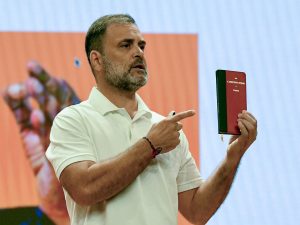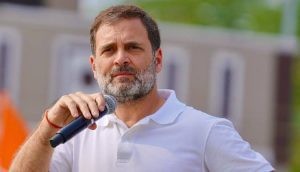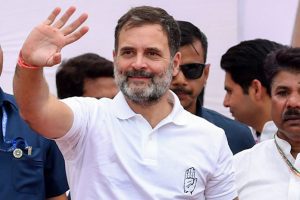Rahul Gandhi in Colombia Warns of Risks to Indian Democracy
During his visit to Colombia Congress leader Rahul Gandhi voiced a deep concern that has long been at the heart of his political discourse. Speaking to students and academics he described the erosion of democratic institutions in India as one of the biggest risks facing the country today. His remarks carried a weight that transcended party lines as he attempted to frame the debate not just as a political rivalry but as a question of India’s future.
A Global Stage for Indian Concerns
Rahul Gandhi has in recent months made it a point to take his message beyond India’s borders. In Colombia his words echoed against a backdrop of international interest in the health of the world’s largest democracy. By framing his critique in a global setting he sought to remind both Indians and the international community that democracy in India is not just a domestic concern but also a matter of global significance.
Attacks on Institutions
Central to his speech was the idea that India’s democratic institutions have been weakened by political interference and over-centralization of power. He argued that free speech independent media and the judiciary have all come under pressure creating an environment where dissent is discouraged. For Gandhi this is not just about the Congress Party or opposition voices but about the very architecture that holds India together.
Linking Democracy to Development
One of the strongest elements of his address was his argument that democracy and economic growth are not separate but intertwined. He suggested that India’s ability to remain innovative dynamic and inclusive depends heavily on its democratic foundation. When voices are silenced and dialogue is stifled he warned the nation risks losing its creative potential. By tying democracy to development he broadened the scope of his message appealing not just to political activists but also to young professionals and business leaders.

Emotional Connect With Youth
Rahul Gandhi’s interactions in Colombia were not limited to speeches. He engaged with students in candid conversations often stepping away from podiums to sit among them. He answered questions on inequality women’s empowerment and environmental challenges with an emphasis on listening rather than lecturing. For many attendees it was this human touch that made his concerns about democracy resonate on a personal level.
Political Reactions Back Home
As expected his remarks drew sharp responses back in India. Supporters within the Congress echoed his sentiments claiming that he was speaking truth to power and highlighting a danger many fear but few voice so directly. The ruling party on the other hand dismissed his statements as exaggerated and damaging to India’s image abroad. This clash of narratives is not new yet it underscores how the debate over democracy has become a defining theme of contemporary Indian politics.
Building an International Narrative
Rahul Gandhi’s Colombia visit is part of a broader strategy to position himself not only as a domestic opposition leader but also as a global voice on democracy. By engaging with international audiences he appears to be betting that building global awareness will create moral pressure back home. His critics argue that such remarks outside India are inappropriate yet his supporters see it as necessary in an interconnected world.

Looking Forward
The conversation sparked in Colombia may not immediately shift the balance of power in Indian politics but it reflects Rahul Gandhi’s determination to keep the issue of democracy front and center. Whether one agrees with his assessment or not his words tap into a larger anxiety shared by many Indians about the direction the nation is heading.
In calling democracy a “major risk” he was not only issuing a political critique but also sounding a broader alarm about the future of India’s identity as a pluralistic and inclusive society. His challenge now lies in converting these global conversations into concrete momentum back home where the battle for India’s democratic spirit continues to play out every day.
Also read: https://channel6network.com/rishab-shettys-kantara-chapter-1/

